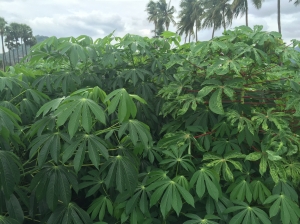Identifying sequences associated with virus tolerance in cassava

Geminiviruses represent an important threat to crop production and food security as they are the causal agents of viral diseases in tropical and temperate staple crops. Understanding natural host resistance opens new perspectives to reduce the negative impact of viral diseases on crop production.
Cassava geminiviruses (CGMs) are the causal agents of cassava mosaic disease (CMD), the most widespread and devastating disease of cassava. Natural host tolerance against CGMs has been identified in the cassava germplasm and extensively used in order to breed CMD tolerant varieties. Despite the important use of the so-called CMD2-based dominant monogenic resistance, tolerance mechanisms have not yet been characterized in cassava.
A whole genome and targeted genome sequencing approach have been used to determine the genomic structure of the CMD2 locus. Despite a relatively good resolution in the CMD2 locus, the project will further increase the resolution by BAC sequencing approach. BAC sequencing approach will contribute to the precise characterization of the polymorphism in the CMD2 region of cassava accessions contrasting for geminivirus tolerance.
Project coordinator:
Plant Genetics Lab, AgroBioChem Department, Gembloux Agro Bio-Tech,
University of Liège, Belgium
Bâtiment 48 N-1 // Room 48-01-40
Avenue Maréchal Juin
5030 Gembloux
Belgium
Represented by Pr Herve Vanderschuren
Email: herve.vanderschuren@ulg.ac.be
Tel: +32 81 62 25 71
Website: http://www.gembloux.ulg.ac.be/plant-genetics/
CNRGV involvement:
Responsible: Caroline Callot and William Marande
BAC libraires construction – screening – BAC clone sequencing
